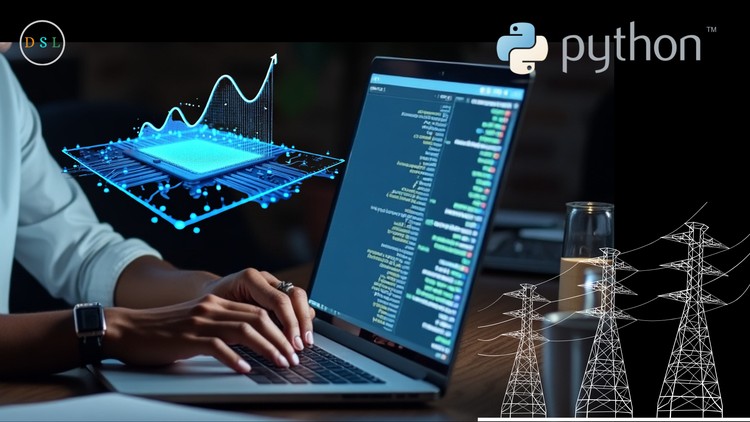
Build an Electricity Demand Prediction Machine Learning Model in Python (End-to-End Tutorial)
What you will learn
Building XGBoost Machine Learning Model
Time Series Data Handling
Feature Engineering for Demand Forecasting
Machine Learning (XGBoost) for Prediction
Model Evaluation (RMSE, MAE)
Understanding Energy Consumption Patterns
Add-On Information:
Note➛ Make sure your 𝐔𝐝𝐞𝐦𝐲 cart has only this course you're going to enroll it now, Remove all other courses from the 𝐔𝐝𝐞𝐦𝐲 cart before Enrolling!
- Master the complete lifecycle of a predictive analytics project from raw data acquisition to actionable forecasts, specifically within the critical energy sector.
- Dive deep into advanced time-series analysis methodologies, understanding cyclical patterns, long-term trends, and abrupt anomalies inherent in electricity consumption data.
- Develop a strong foundation in data preprocessing and validation techniques, transforming disparate raw energy consumption figures and external variables into a clean, model-ready dataset suitable for machine learning.
- Gain hands-on expertise in feature engineering beyond basic aggregations, creating insightful, predictive variables from timestamps, meteorological data, and economic indicators to dramatically improve forecasting accuracy.
- Implement and thoroughly fine-tune a powerful gradient boosting algorithm (XGBoost), learning its core principles, hyperparameter optimization strategies, and advanced configurations for optimal performance in real-world forecasting tasks.
- Understand the strategic importance of highly accurate demand forecasts for grid management, resource optimization, energy trading, and preventing outages, directly impacting energy efficiency, sustainability, and operational cost savings.
- Acquire critical proficiency in interpreting complex model results and performance metrics, translating statistical indicators like RMSE and MAE into practical, actionable insights for energy utility decision-makers and stakeholders.
- Build a robust, industry-relevant portfolio project in Python that comprehensively showcases your ability to tackle end-to-end predictive challenges with state-of-the-art machine learning.
- Explore effective techniques for visualizing time-series data, model predictions, and forecast errors, making complex patterns and model discrepancies comprehensible for both technical and non-technical audiences.
- Learn best practices for structuring an ML project codebase, ensuring reproducibility, scalability, and maintainability for future enhancements or potential deployment in production environments.
- Understand how to identify and mitigate common pitfalls in time-series forecasting, such as data leakage, stationarity issues, and overfitting to historical patterns, to build more robust models.
- Develop a critical understanding of the intricate interplay of various external factors influencing electricity demand, including meteorological conditions, calendar events (holidays, weekends), economic activity, and societal behavior.
- Prepare yourself for high-demand roles requiring predictive modeling skills in the energy sector, utilities, smart grid initiatives, and related domains, leveraging data science to drive operational excellence and innovation.
- PROS:
- Highly practical, end-to-end project experience with direct industry relevance.
- Focuses on a high-impact, real-world problem with significant societal and economic implications.
- Utilizes a state-of-the-art and widely adopted ML algorithm (XGBoost) for superior performance.
- Helps build a strong, demonstrative portfolio piece showcasing full ML project lifecycle skills.
- Teaches transferable skills in data cleaning, advanced feature engineering, and robust model evaluation applicable to many diverse domains.
- Strong emphasis on Python for practical machine learning development, a highly sought-after skill.
- Excellent for career development in data science, machine learning engineering, or energy analytics.
- CONS:
- May assume basic familiarity with Python programming and foundational data science concepts, potentially challenging for absolute beginners without prior exposure.
English
language